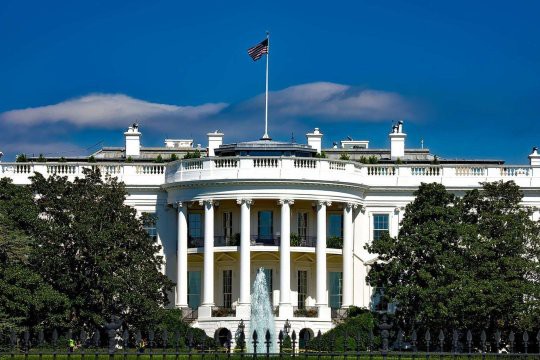Judging by American media reports, the US federal government will face a partial closure, known as ‘shutdown’, if the Congress fails to adopt at least a temporary legislation on government budget for the next fiscal year, due to begin on October 1.
Under the law, in the absence of the parliament-approved government budget, the majority of government agencies must reduce the number of staff not listed as vitally important and will have to stop or slow down their operations during the shutdown. At least one million federal employees will have to work without pay or go home. Federal programs in support of low-income families will be hit the most. Tax inspectors will cease to service tax refunds and farmers will no longer receive soft loans. National parks and memorial complexes will suspend their work, which is bound to hit businesses that depend on tourism. The only category of citizens which will not be affected by the measure is servicemen doing military service – they will continue to perform their duties and receive their pay. Federal security employees at airports will have to work for free. So far, such a catastrophic scenario has been avoided but the issue is far from solved and is haunting the USA year after year.
Under the US Constitution, federal government budget is approved by the Congress, and this is approximately one third of the expenses. Most social programs, such as Medicare, medical service for the elderly, is financed automatically. In the 1970s there appeared an arrangement under which the Congress must adopt 12 separate bills regulating government expenses for each of the key areas, such as housing construction, defense, agriculture etc. Each of the bills is drafted by the corresponding committee. If members of the committee fail to agree on the amount of spending the Congress orders it to prepare the so-called ‘reconciliation’ bill.
In reality, the Congress has not voted on separate funding bills since 1996. Such voting would require too many rounds each of which triggers long-lasting debates and political bargaining. Instead, they adopt general bills which finance everything and anything. At times, the Congress can’t even cope with these ones. Then, they resort to «continuing resolutions», which maintain the expenditure at the current level until the lawmakers come to agreement. Such an approach, among other things, impedes the reform of government agencies. In the long run, conciliatory procedures have turned into a political trick that makes it possible to pass a law through the Senate by only 51 votes in place of 60, which are necessary to secure the approval of the budget in conformity with all the rules. Since the 1990s, many important laws, which regulate implementation of national government programs, have been adopted thanks to this so-called “roundabout maneuver».
The last important feature of the budget process is that until 1980 federal agencies frequently worked in the conditions of funding deficit, until the Congress formally approved their maintenance expenses. However, in 1980 the then prosecutor general came to the conclusion that the only way for federal agencies to avoid violating Antideficiency Act, which prohibits the government to spend money for which no funding was allocated, was to stop work until the Congress provided the financing needed. This encouraged lawmakers to speed up the decision-making process concerning budgetary spending. On the other hand, it turned the budget issue into one of the most pressing, even though controversial, instruments of political struggle in Washington.
Both the Congress and the US president resort to government shutdown for achieving their political goals. Since 2000 the US government has suspended the work of government agencies four times, three times during the legislature of Donald Trump. For one, in 2013 the Republican majority in the House of Representatives tried in vain to use this method to force Democratic President Barack Obama to abolish the law on accessible healthcare – a major healthcare reform since the mid1960s. The third shutdown, which occurred during Trump’s presidency, was initiated by the head of the White House, since the Congress, controlled by the Democrats, refused to allocate funding for the construction of a protective wall on the border with Mexico. Trump failed to secure the result desired too.
The current aggravation over the decision on the government budget results from severe differences between the two chambers, not only on the general level of spending, but also, and this is the most important thing, on political issues. Heated debates are under way on the expediency of maintaining the present level of assistance for Ukraine A new increase in spending to help Kyiv is causing acute opposition from conservative Republicans who are part of the House Freedom Caucus. According to CNN reports, the money variance between government budget projects elaborated by the Democrat-controlled Senate and the Republican majority in the lower house amounts to 153 billion dollars. American lawmakers have only 12 working days in September. Observers at Capitol Hill are talking not just about the likelihood of a shutdown, but the time it could start.
The situation is becoming yet more complicated due to the shaky stance of the House of Representatives Speaker, Republican Kevin McCarthy. Early this year, McCarthy secured his position with tremendous effort – it took 15 rounds of voting. In return for the post, McCarthy vowed to refrain from putting on the agenda any issues which did not gain majority from members of his party. Meanwhile, Republicans enjoy a mere 4-vote majority in the House of Representatives. In addition, McCarthy was elected on the condition that even one deputy would have the right to propose removing him. In spring, while holding fierce debates on increasing the ceiling of government debt, Congressmen came to yet another compromise under which the debt ceiling would be increased. However, if they fail to pass a long-term legislation on government budget now, in autumn, most of the government expenditure will be automatically cut by 1 percent. Some party members are threatening McCarthy with resignation if he proves unable to demonstrate the ‘appropriate determination’ in the budget issue.
Members of the House Freedom Caucus claim that they are not afraid of the government shutdown and are planning to use the threat to make the Democrats reconsider a whole range of vital political issues, such as, measures to toughen the asylum granting procedure. Among other demands is the cessation of the work of prosecutors who are conducting an inquiry into accusations against former President Donald Trump. Yet another condition which the conservatives insist is indispensable for them to support the allocation of funds for the executive branch is the demand to hold a voting in the Congress on the possibility of starting impeachment proceedings against President Biden.
What are radical Republicans hoping to achieve? Shutdown poses danger for any incumbent president, particularly if it weakens the economy in the run-up to elections. In the course of the three previous shutdowns the president’s approval ratings went down. The Republican are thereby hoping to further undermine the trust of American voters regarding the incumbent head of the White House. Joseph Biden. At present, the number of American respondents who “disapprove” of his work as president exceed the number of those who “approve” by more than 15 percent.[i]
In the meantime, in the case of a shutdown, the present head of the White House has the right to declare “a state of emergency”, which will enable him to finance the operations of a number of federal agencies without the approval of the Congress. In addition, as Speaker McCarthy reminded the conservatives, the stoppage of government work may lead to the stoppage of any inquiry into the possibility of the impeachment of President Joe Biden. Finally, the battle over shutdown may intensify the struggle between Republican Congressmen who have good chances for re-election, and those whose political future is uncertain. And also, between the activist wing of the Republican party and voters with centrist views who are of great value for the party if it hopes to run for majority in both houses of the Congress next year.
A lot will depend on the duration of the shutdown. The chaotic information agenda of today quickly switches the attention of the voters from one “high-profile” event to another. As Washington’s political old timers indicate, there is a huge difference between the popularity of this or that political issue and the people’s attitude as to the methods to be used to address it. While voters could ardently support this or that political initiative in essence, they might not have the slightest desire to back the attempts to promote this issue by means of suspending the worl of government institutions.
From the economic point of view, failure to adopt the budget will result in further political uncertainty, which is what Fitch ratings agency pointed to in August, when it sent America into a stir by resolving to lower the US credit ratings. The stoppage of the work of the federal government will lead to a reduction in spending, which might further undermine the American economy. And the US economy is already experiencing the burden of such negative factors as the toughening of the monetary and credit policy of the Federal Reserve, the likelihood of a further rise in inflation, the continuing threat of recession, and the increasing possibility of a debt crisis. According to Goldman Sachs, in the case of a shutdown, the reduction in government spending will result in the reduction of the GDP by 0,6%.[ii]
The worsening of the US domestic problems has a negative impact on its image among its nominal allies in Europe. Feeling doubts as to the position of the USA, Europeans are beginning to reconsider the nature of trans-Atlantic ties. Judging by the surveys of late, most residents of the Old World would prefer their countries to stay neutral in order to be on the safe side in case of a hypothetical confrontation between the USA and Russia, or between the USA and China. The arrival of Biden, as it seems, did nothing to secure a dramatic shift of geopolitical moods in the European public opinion.
The “crisis of American democracy” is becoming a shared point of discussion among mainstream commentators, who are wondering where the limit for political polarization in the USA is. Undoubtedly, he ongoing fierce struggle in the Congress over the government budget forestalls the battle for the White House in 2024. The unconditional adoption of any decision by the Congress requires a two thirds majority in both houses of parliament, and neither of the parties has it. Present-day America is too divided, and the dissenting camps are nearly equal in strength. Therefore, should there be a shutdown, it might drag on indefinitely, having opened a new chapter in the history of degradation of the American system of government regulation and economy, as a result.
The opinion of the author may not coincide with the position of the Editorial
[i] https://projects.fivethirtyeight.com/biden-approval-rating/
[ii] https://www.reuters.com/markets/us/potential-us-government-shutdown-could-dent-investor-confidence-2023-09-08/
read more in our Telegram-channel https://t.me/The_International_Affairs

 11:26 14.09.2023 •
11:26 14.09.2023 •



























